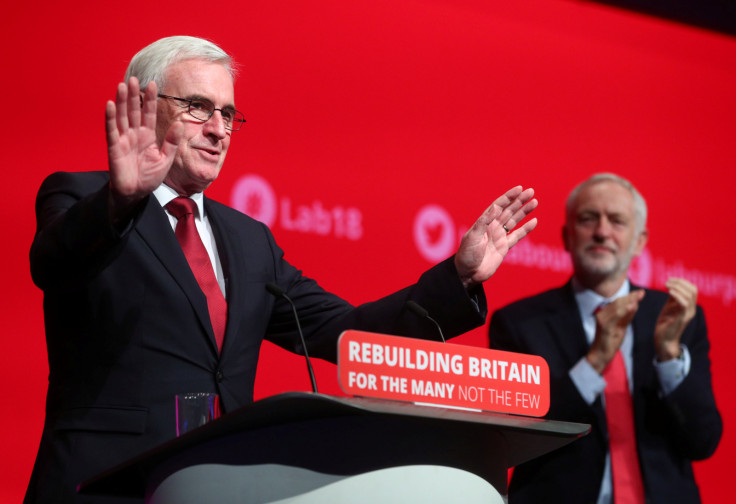Labour and John McDonnell are right to give workers a stake, says company law professor
Shadow chancellor unveiled striking proposals on employee ownership and employee representation on the board, at Labour Party conference.
The shadow chancellor's conference speech on September 24 set out the Labour Party's radical new economic policies to tackle inequality and increase industrial democracy. John McDonnell paid tribute to the "brilliant" work of the Institute for Public Policy Research (IPPR) think tank and its recent report Prosperity and Justice, upon which much of Labour's polices are based. His speech included striking proposals on employee ownership and employee representation on the board.
Under the proposals, all UK listed companies with more than 250 staff would be legally required to transfer 1% of their ownership into an "inclusive ownership fund" of collectively held shares. Employees would have the same voting rights as shareholders but, unlike shareholders, their dividends would be capped at £500 a year. Any surplus – estimated at £2.1 billion – would be transferred back to social services as a "social dividend".
Companies, McDonnell rightly stated, benefit from the vast investments made by society, so they should contribute to its upkeep. The inclusive ownership fund would be locked into the company, non-transferable and administered by a board of employee trustees.
In respect of corporate governance, all companies with over 250 employees would be required to have one third of its board peopled by employee representatives.
For the many corporate law and governance scholars who have argued for similar changes, there is much to be celebrated in these bold proposals. But, as they stand, they are not without issues that need teasing out. Here are a few.
It is not clear how employee share ownership will reduce the social, economic and environmental problems caused by the way that companies are currently run for shareholders. This has long been an issue highlighted by corporate law scholars.
The IPPR report itself argues that the shareholder value focus of UK companies prioritises short-term returns over long-term investment, in which dividends trump investment in production. It notes that 55% of cash flow is devoted to dividends today, compared with 39% in 1990. And this is regardless of actual profits, which have been much lower since the 2007-08 financial crisis.
Indeed, the short-term goals of shareholders are further amplified today because the majority of FTSE shares are owned by foreign investment funds whose management are rewarded for short-term returns. Giving employees the same shareholder voting rights as shareholders would only act as a counter to these powerful interests if the numbers were comparable – which seems unlikely.

Failure to protect employees
Both McDonnell and the IPPR say worker ownership and control will enhance company efficiency, pointing to the success of European economies. McDonnell points out that employee ownership is four to five times higher in Germany and encourages productivity and long-term thinking. Similarly, the IPPR report states:
Countries which adopt stakeholder models of corporate governance with formal means of employee representation have stronger R&D investment performance, higher productivity and lower inequality than shareholder centric models.
But these stakeholder systems have consistently failed to protect employees. The legally mandated representation of employees on the supervisory boards of large companies (but not the management board) current in Germany has not protected employees from the huge inroads into their rights as workers in such legislation as the Hartz reforms.
Supervisory boards are designed to protect the company, and its profitability, rather than its employees. This is one reason for the longstanding rejection of this model by UK trade unions in the past. As UK companies are currently structured to have a single board of directors (unitary boards), McDonnell's proposals would increase the areas in which employee representatives could participate.
But, to be effective, Labour's proposal would need to be clear about employee roles on boards – is it for the protection of shareholder value (in which employees would participate) or the protection of jobs and investment? And, if it's the latter, how they would realistically achieve this.
Problematic details
It is also worth noting that the EU has dramatically shifted away from the idea of stakeholder governance to shareholder empowerment. So, when espousing the benefits of the EU's approach to corporate governance (as both McDonnell and the IPPR do), the UK should proceed with caution.
Over the last ten years, the EU has launched and spread "stewardship codes", which encourage more shareholder involvement in governance. Plus, the EU's Shareholder Rights Directive 2017, which gives more powers to shareholders to dictate company policy, was adopted in spite of the EU's own reports showing that shareholder primacy drove the destructive short-termism and risk taking that caused the global financial crisis.
Finally, the claim that employee engagement enhances efficiency is highly problematic as it collates what is good for employees with what is good for shareholders. Yet, what has produced good returns for shareholders is a low paid, flexible domestic workforce and offshore workers that are highly exploited, as well as huge corporate debt to fund share buy backs and speculative financial investments.
So, there is a lot of detail to iron out. But what remains heartening in McDonnell's speech was Labour's mission to treat workers – and to make companies treat workers – not as costs or welfare burdens, but as the creators of value who are entitled to the "full fruits of their industry". Or, at least, to some of it.
Lorraine Talbot, Professor of Company Law in Context, University of Birmingham
This article is republished from The Conversation under a Creative Commons license. Read the original article.

© Copyright IBTimes 2025. All rights reserved.





















